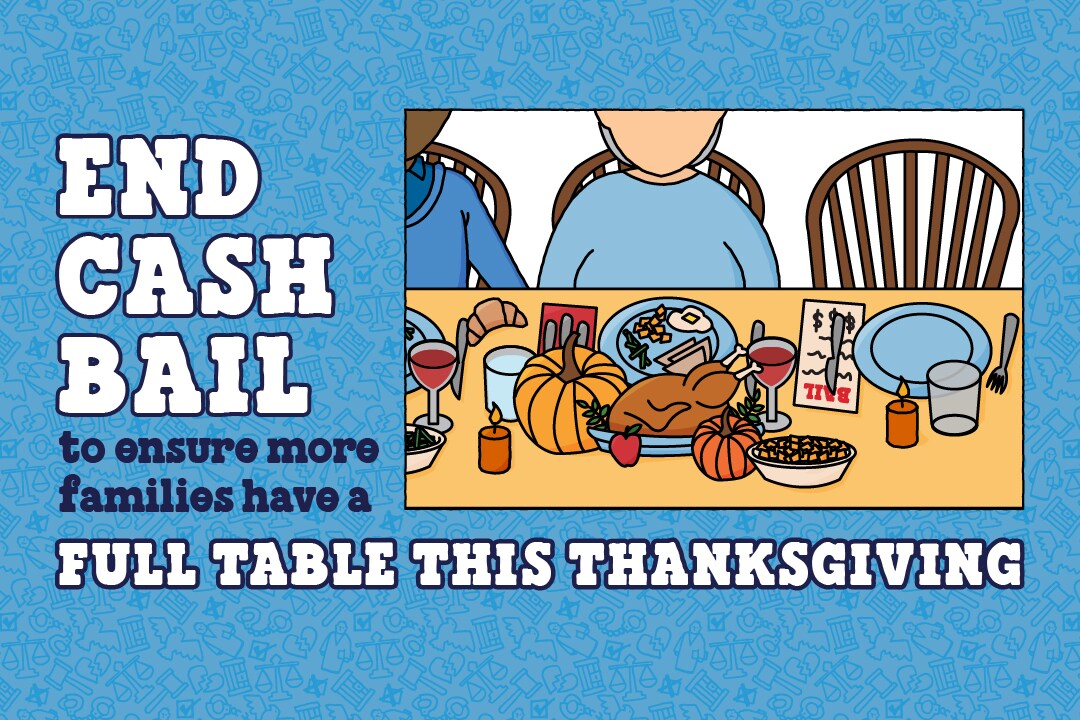Celebrating a Sweet Anniversary: 10 Years of Partnering with Fairtrade Cocoa Farmers
The secret ingredient in our chocolate? Fairness. We’re celebrating 10 years of directly partnering with Fairtrade cocoa farmers to build thriving farms.

For many of us, Thanksgiving is a time when loved ones gather together. There’s nothing like pulling up a chair at a dining table heaped with delicious food, surrounded by friends and family.
But for many families, some seats at that table will be empty this year. Why? America’s system of predatory cash bail.
Nearly 500,000 people who are simply awaiting their trial will be behind bars instead of home with their families this Thanksgiving for one reason only—they don’t have enough money to pay for bail. We think that’s wrong.
Cash bail is the price of freedom: If someone who has been arrested can afford to pay bail, then they can go free before their trial. But if they can’t, then they stay locked up—away from their family, away from the people who mean the most to them, away from their community.
This is why hundreds of thousands of people in the US are incarcerated right now even though they haven’t been convicted of the crime they were charged with. They’re behind bars not because they’re dangerous, but because they can’t afford bail. Research shows that 80% of people tangled up in our criminal legal system can’t afford basic necessities, like food or rent, let alone a lawyer or the cost of bail. Bail amounts as low as $250 or $500 have a devastating impact on them and their families.
TLDR: Cash bail criminalizes and perpetuates poverty.
Here are some facts that’ll help shine a light on the threat that cash bail poses to families:
Making matters even worse, cash bail disproportionately impacts Black and Brown people. Black people are routinely held in jail longer than white people who were charged with the same crimes.
Despite what proponents say, cash bail doesn’t deter crime. It doesn’t ensure that defendants show up at their trials.
What does it do? It criminalizes poverty. It preys on those who can least afford it. Studies have shown that spending even one day behind bars can take a terrible toll on people and their families.
In this “guilty until proven wealthy” system, people who are locked up because they can’t pay bail are at an increased risk of:
When a parent is behind bars, nobody suffers more than their kids. More than 5 million children in the US have experienced the incarceration of a parent. For them, Thanksgiving Day, and every day, is filled with loss.
Kids who’ve had a parent behind bars are more likely to:
Having a parent who has been incarcerated for any amount of time can be destabilizing and confusing for children. Ending cash bail will help keep families together—and help kids thrive.
The good news is that activists and people who have been directly impacted have been working hard to make systemic change.
Just last year, Illinois became the first state in the nation to end cash bail! Since then:
Pretrial release decisions in Illinois are now based on the facts, not a defendant’s finances. That means more and more people are able to keep their jobs, pay their rents, and maintain family and social connections while awaiting trial—which helps them AND their communities.
Thanks to the hard work of activists, many more Illinois families will be together this Thanksgiving than last. Now we need to do the same for families all across the US.
Ending cash bail reconnects families and strengthens communities. Join the movement to end cash bail today!
Subscribe Now And We'll Make Sure You Get The Inside Scoop On Ben & Jerry's Movements, Fun And Flavors! It's Like Dessert For Your Inbox, And You're Going To Want Seconds.